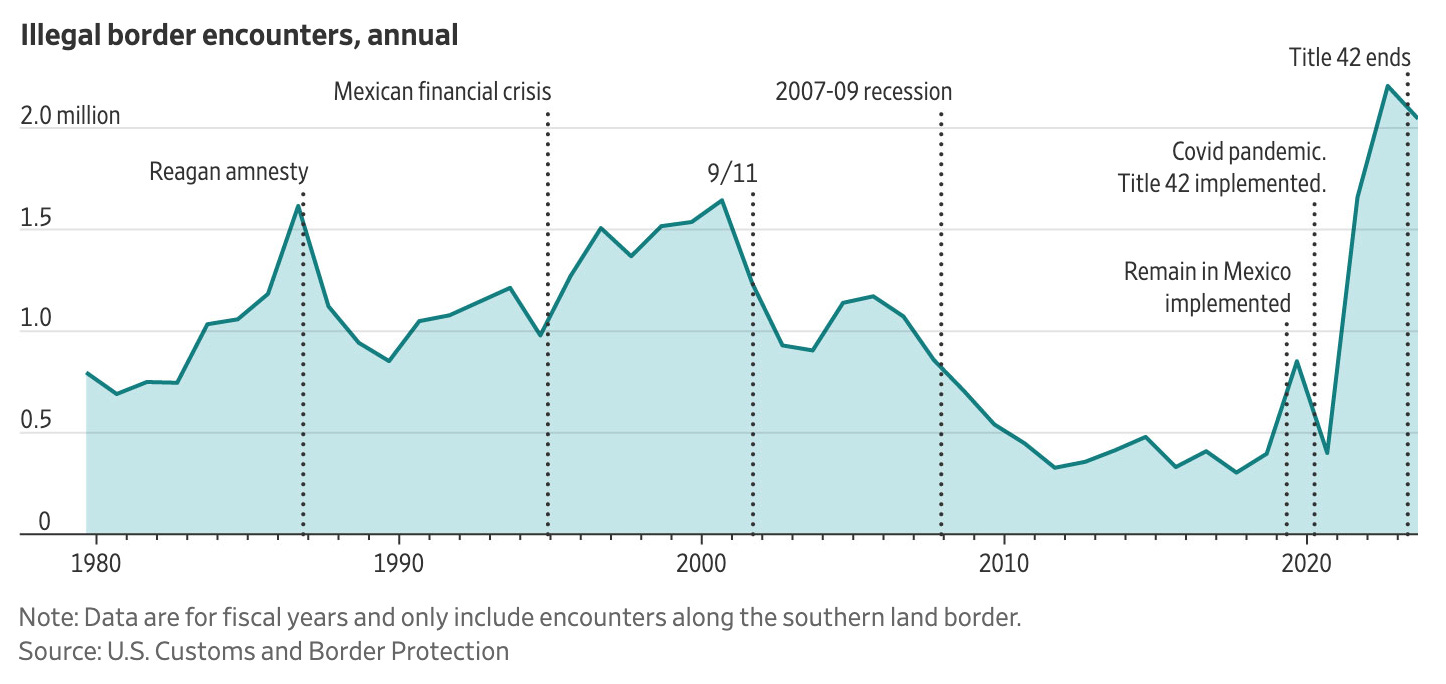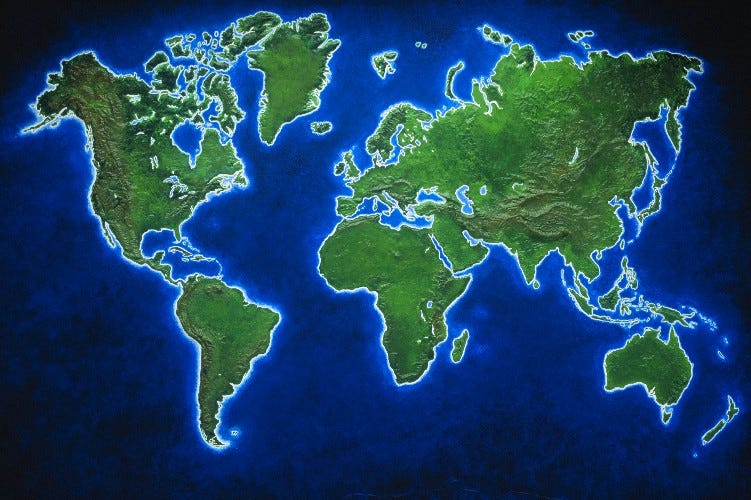
In part one of this series, I argued that countries should have enforceable borders. In part three, I’ll make the ethical case for higher levels of immigration. But this article is about making the case for more immigration purely in practical terms, because when you’re trying to persuade people, “here’s what you get from this” is a good place to start. Sacrifice is a hard sell; pity the Mormon missionaries who have to start their sales pitches with “are you tired of sex and caffeine?” Musings on ethics and reciprocity will have to wait for part three — this column is basically Migrants = Money: How the Huddled Masses Yearning to Breathe Free Can Make You Stupid Rich.
Immigration typically creates wealth by making it easier for workers and employers to connect. There’s a lot of research about this, but I don’t want this column to become Research Orgy 2024. Debates about immigration often turn into people waving white papers at each other, which is useless because you can find a study that says just about anything. Also, research-based arguments are 70 percent less effective than narrative-based arguments, which is obviously a stat I just made up, and the link under “70 percent less effective” goes to a picture of two goats humping. Of course, two goats humping is still a better source of information than about two-thirds of the academic journals that exist these days.
The main insight that links immigration to economic growth is that most people have goals, and when they’re free to pursue those goals, that turns into economic output. The genius of capitalism is that it converts selfish douchebaggery — of which we all have ample reserves — into the fuel of economic growth. But when people lack opportunities — when they can’t get a job, start a business, or take steps that would lead to those things — then they can’t create wealth for themselves or others. Consider my case: I’m a TV writer from Great Bridge, Virginia. If Great Bridge was a country, not a town, and I had been forbidden from emigrating to New York, then I would have had to sit around and wait for a TV show to come to Great Bridge. And the only productions that happen in Great Bridge tend to be Weather Channel reports of a hurricane’s aftermath and amateur porn.

The most obvious way that immigration makes Americans rich is that high-skilled immigrants generate gobsmacking amounts of wealth. The US enjoys a massive advantage from being the prettiest girl at the knowledge economy dance: In 2022, 77 percent of non-Americans working in AI stayed in the US after completing their PhDs. 44 percent of Fortune 500 companies were started by immigrants or the children of immigrants. The case that high-skilled immigrants greatly benefit society is such a slam dunk that I don’t want to waste much time making it. Let’s just recognize: The fact that these people want to live here is an absolute blessing and we should do everything in our power to welcome them. Getting an H-1B visa should be substantially easier than getting a Safeway card; we should be greeting high-skilled workers at the airport with confetti, baked goods, and offers to help move their stuff. America is to smart people what Brooklyn is to theater kids, and we’re shooting ourselves in the foot when we make it hard for high-skilled labor to migrate.
The case for low-skilled labor is, I think, less obvious but also very real. For starters, let’s recognize that the ability to show up every day and work a construction or service industry job should be considered a skill. Have you ever worked construction? Ever worked at a restaurant? Those are hard jobs. There’s a reason why we sometimes call these “jobs Americans don’t want to do” — realistically, nobody wants to do them. But some people have enough grit to haul their asses into these jobs day after day while you and I are taking mental health days because we accidentally flavored our morning coffee with regular vanilla instead of French vanilla. Hard jobs need to be done and it’s not always easy to find people willing to do them.
But what effect does that have on native-born Americans in “low-skill” jobs? I think that’s an important question, and I don’t want to try to wave it away with academic literature. There are, indeed, many studies that look at labor markets and find little or no downward effect on wages, but I don’t want to assume that that will be true for every time and place.1 Still, we know that the story is more complicated than “more labor = lower wages”. The first reason why that’s true is that immigrants don’t just take yer juuurb; they also create yer juuurb. When immigrants make money here, they also spend money here, and that creates jobs (and not just for academics producing studies that find no relationship between immigration and lower wages). The second reason why that’s true is that the labor pool has already been expanded by illegal immigration. If we expand legal immigration, part of what we’ll be doing is to convert that undocumented, black market labor pool into legal workers who are subject to American labor laws.
An uncomfortable truth is that we are only sort-of in control of migration flows. Politicians don’t highlight this often; few speeches contain the line “I am but a leaf being tossed about by the vast ocean of fate, aware only of my own inconsequence…anyway, vote for me!” But the reality is that our immigration flows are driven more by economic conditions and world events than by policy. This chart of illegal immigration encounters was in The Wall Street Journal recently:
When the Mexican economy tanked in 1995, illegal immigration surged. And when the American economy tanked in 2008, illegal immigration waned. I wouldn’t say that policy doesn’t matter at all — it clearly matters some. But when things in the US are much better than things other places, people will come, legally or illegally. I view anti-immigration efforts a bit like pro-abstinence efforts: There might be some effect, but you’re crusading against some of the most powerful impulses known to man, so keep your expectations low.
Since “no immigration” is not really an option, the choice is really between legal immigration and illegal immigration. Which brings me to crime. Personally, I think that crime is bad (this take makes me a “centrist” in some people’s eyes, and so be it). I would not want to import the crime rates of many of the countries close to the US. And that’s why I would like the people who are here to be on the grid. Legal immigrants can be put through background checks and are easier to find if they commit a crime. Also, legal immigrants are far more likely to report a crime than illegal immigrants — illegal immigrants don’t exactly love calling the police. There’s also research suggesting that both legal and illegal immigrants commit crimes at lower rates than native-born Americans, but I want to stick to my commitment to not have my arguments be research-dependent. Crime is easier to manage when we have less illegal immigration, and we’ll have less illegal immigration when we meet our labor needs the legal way.
Finally, there’s culture. I don’t see a way to make a practical case for cultural integration; that would require a normative argument that some cultures are “good”, which seems like a dumb thing to argue. But I’ll say this: The US has been adding different cultures to the mix for hundreds of years, and it’s gone amazingly well. America isn’t just an economic superpower: We’re a cultural superpower. Our brand is strong, and we’ve had the best entertainment in the world for over a century, last seven installments of the Star Wars franchise notwithstanding. Our success is partly because we draw people from all over the world. Every wave of American immigrants has been slandered as dangerous degenerates too hopelessly foreign to ever assimilate, and it’s only been true once (Irish Catholics).2
Ultimately, I think that the best data point arguing for high levels of immigration is the United States itself. We are a phenomenally successful country. When we broke away from Britain, we were a beaver pelt-based economy in which one guy (Thomas Jefferson) owned 95% of all the books. Now, we’re a superpower by anyone’s definition, we’re rich in ways that people a few generations ago could not have imagined, and we’re so used to winning that we only watch the Olympic events in which there’s an 80 percent chance or higher of a gold medal. We can’t that say our success is because of high levels of immigration, but it’s certainly compatible with high levels of immigration. Which is one reason to want more immigration in the future.
Also, I worry a lot about publication bias in this area of academic literature.
If you’re new to the blog, I’m joking.








At the risk of getting yelled at, it doesn't seem *that* difficult to argue for some degree of cultural integration.
It's not that every immigrant should forget its native language and start watching baseball. It is simply that Americans have collectively decided that some practices, such as holding regular elections or women being allowed to show their hair, are good and should be continued. And while opponents are certainly free to make their case, the country will not be made healthier or more prosperous if all foreigners start being obnoxious and demanding things happen like they do in their former country. There should be some willingness to accept the existing customs in the country you get in, just like the people living there are expected to make allowances for the immigrant's different background. After a time, the rough edges will be smoothed and the differences will no longer be remarkable.
This process is desirable because it gives some cohesion to the country, which in turn allows people to do their best.
I think you pay short shrift to cultural factors, which are not necessarily racist or bigoted (not that you implied otherwise). It is not unreasonable or close-minded to prefer to live among people who mostly speak your language and share your values (about treatment of women, sexual minorities, playing loud music, covering your head and face). I agree that some cultural diversity is enriching. But when people start to feel overwhelmed by neighbors who approach the world seemingly radically differently, we get Trump and AfD and Viktor Orban.